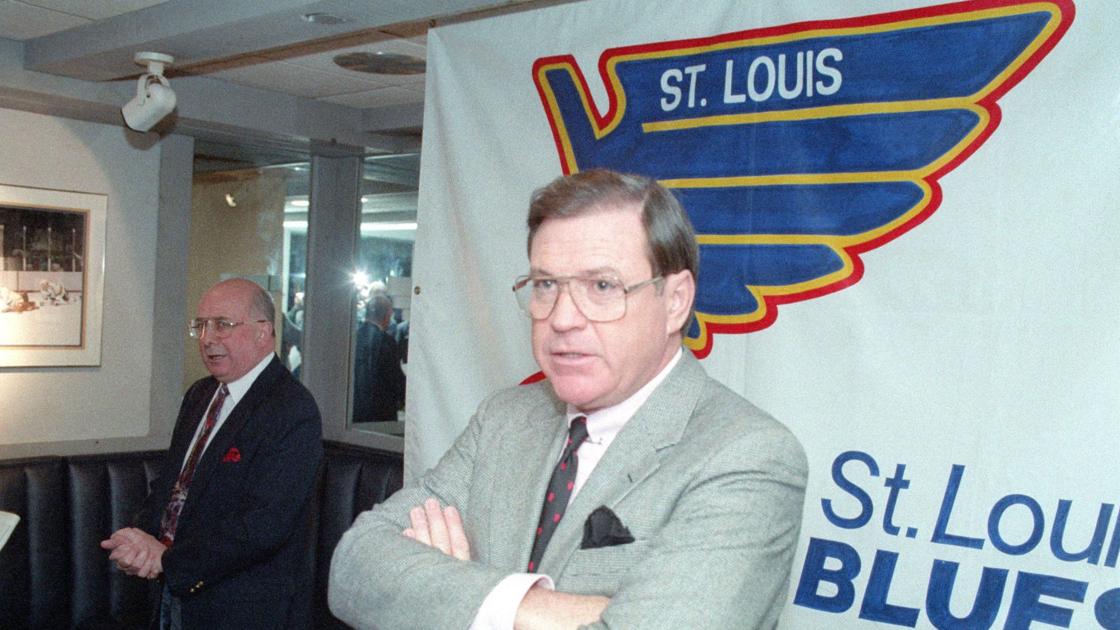Michael F. Shanahan’s gregarious personality and daring management style made him one of the most popular executives in this region’s sports history.
Under his leadership in the late 1980s and early 1990s, the St. Louis Blues regained their standing as a mainstream sports attraction. The franchise’s revival led to the construction of a downtown arena that opened in 1994.
The hockey community mourned Shanahan’s death Monday at the age of 78. He had recently had a double lung transplant.
“The St. Louis Blues organization is saddened to learn of the passing of former Blues Chairman Mike Shanahan,” Blues Chairman Tom Stilllman said in a statement released by the team. “Mr. Shanahan set a shining example of leadership both on and off the ice. He captivated Blues fans and made an immeasurable impact on the organization. He will forever be remembered for his passion for the Blues, his engaging personality, and his acquisition of Brett Hull.”
Shanahan, a former soccer star at St. Louis University, was president of Engineered Support Systems Inc. when Mayor Vincent C. Schoemehl Jr. came calling. Would he be interested in helping give the Blues local ownership?
“That’s a question you don’t expect,” Shanahan later recalled. “But we began discussing it, and I got involved.”
Shanahan led an investment group that purchased the Blues from California businessman Harry Ornest in December 1986. At the same time, the city purchased The Arena from Ornest.
“There is some melancholy attached to all of this,” Ornest said at the time. “‘But with Mike Shanahan, I think the team is in the best possible hands.”
Fans would quickly come to agree with that assessment. While Ornest saved the franchise for St. Louis after the NHL blocked its move to Saskatoon, he alienated fans by ordering a series of financially motivated trades.
Shanahan worked to regain the public trust. Roaming the concourse of The Arena during games, Shanahan mingled with fans and sought their feedback.
“Mr. Shanahan had that incredible personality that touched everyone he ever met,” longtime Blues star Bernie Federko said in a statement released by the team. “It was under his ownership that the Blues reconnected with all our great fans.”
Shanahan attended function after function to rally support for the franchise.
“Pride is contagious,” he said in 1991. “When the team and the fans realize the owners have pride in the team, they feel it, too. Players are proud to wear the Blue Note. Fans are proud to support the Blue Note.”
The big breakthrough of his ownership came during the 1987-88 season with the acquisition of Hull from the Calgary Flames. The Golden Brett electrified the city by breaking out for 72 goals during the 1989-90 season.
“He put St. Louis on the hockey map,” Shanahan would later recall. “We went from being a doormat to being feared around the league. We started to make a little noise and people had to take notice.
“Hull played a role in people realizing there was hockey in the United States outside of Chicago. My theory of sports is that people want to see stars play. It’s the entertainment business and it’s built around stars, and Brett Hull was the brightest star.”
On Shanahan’s watch the small-market Blues became the NHL’s most aggressive operation. Team president Jack Quinn and general manager Ron Caron made one high-profile personnel play after another.
They shocked the league by signing free-agent defenseman Scott Stevens in 1990, yielding five first-round picks to the Washington Capitals in the process. When the team signed free agent winger Brendan Shanahan from the New Jersey Devils a year later, the league responded with a stern rebuke.
Judge Edward Houston’s arbitration ruling awarded Stevens to the Devils in September 1991.
Undaunted, Shanahan and Co. stayed on the attack, signing Mike Keenan as coach on the heels of his Stanley Cup triumph with the New York Rangers in 1994.
That was Shanahan’s last big move for the Blues.
By 1990 Shanahan had sold his ownership stake to the Kiel Center Partners as that group led efforts to build a new downtown arena for the team.
Shanahan stayed on as team chairman until replaced by former Cardinals executive Jerry Ritter after the 1994-95 season.
“I am very fortunate to have been a part of the St. Louis Blues since day one,” former Blues defenseman Bob Plager said through the team. “When I look back on all these years of the great players, great owners and great fans, one of them stands out and that’s Mike Shanahan.”
Ultimately Shanahan became a victim of his own success. Under his leadership the Blues became a far more popular sports entity in St. Louis. Members of Civic Progress took a greater interest in the team and decided to back the new arena project.
They also wanted their own guy running their team. Shanahan drifted away from the sports scene and concentrated on operating his fast-growing company.
In 2008 Shanahan pleaded guilty to a federal charge for backdating stock options and agreed to repay $7.9 million. In exchange for the guilty plea on one count of falsifying the records of a publicly traded company, the government dropped 11 other charges against Shanahan. The government also agreed to drop charges against his son, Michael Shanahan Jr.
Shanahan is a member of the Billikens Hall of Fame and Missouri Sports Hall of Fame.
“Mr. Shanahan was a very special man,” Hull said via Twitter. “I looked up to and respected Mr. Shanahan in all aspects of life. He made people better and I know I am better having known him.”
“Mr. Shanahan brought me to St. Louis and I will forever be grateful to him,” former Blues defenseman Al MacInnis said in a statement released by the team. “We have made STL our home and raised our kids here all because of his approval. Our thoughts and prayers are with the Shanahan family at this time.”


